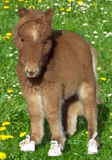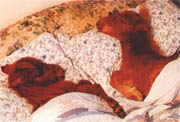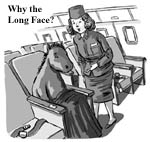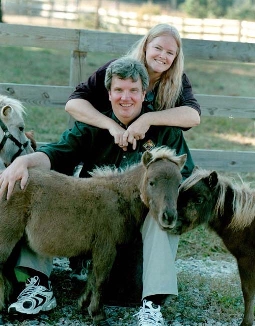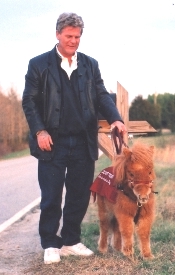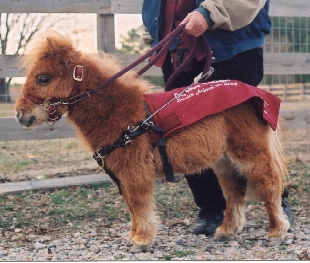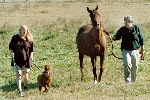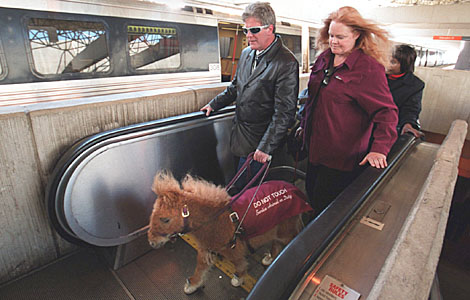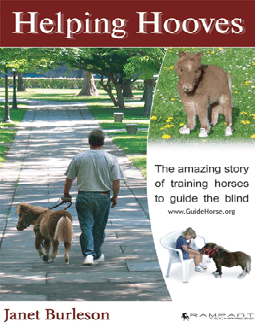No more horsing around
Ellsworth man adopts equine to help him see
BY BILL TROTTER
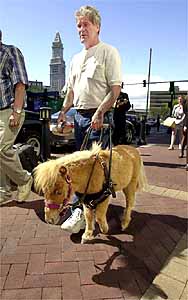 |
ELLSWORTH - Many people, either out of necessity or
preference, use horses as a mode of transportation.
Ellsworth resident Dan Shaw soon may count as one of
these people because he, too, will have a horse to help
him get around.
Shaw, however, will not use his horse as a pair of
substitute legs, as many people do. Instead, he will use
the mare as a pair of substitute eyes.
Shaw is 99 percent blind and in the process of adopting
a miniature guide horse to help him negotiate the
physical world around him. Guide dogs are nothing new
and can occasionally be seen helping sight-challenged
people as they venture out into public spaces. Using a
miniature horse for the same purpose, however, is
something that Shaw will be the first documented person
in the world to do. |
Shaw recently experienced a milestone in the relationship he
is developing with the 23-inch tall horse, whose name is
Cuddles. Last week he flew down to Raleigh, N.C., where she is
being trained for her unprecedented mission, and met Cuddles for
the first time. He said the horse, along with her trainers Janet
and Don Burleson, met him at the airport when he got off the
plane.
"I got down on my knees and said hello to her," Shaw
explained. "We hit it off right away."
The introduction was not a private one. The story of Shaw and
Cuddles is one that has developed national and international
appeal. According to Shaw, the media outlets on hand to cover
the event included television networks ABC, NBC, CBS and Fox,
cable network The Discovery Channel, and the Los Angeles Times
and Chicago Tribune newspapers. Even reporters from England and
Japan were there to see Shaw meet Cuddles face-to-face for the
first time.
"Everybody was there," Shaw said. "It was
awesome."
According to Shaw, who grew up on the North Shore in
Massachusetts, all the publicity around him and Cuddles
contrasts starkly with the attention his degenerative condition
originally received. He said that even though he was diagnosed
with retinisis pigmentosis at the age of 17, it has taken him a
while to accept the fact that eventually he will be completely
blind. Though the disease is genetically transmitted and his
three brothers all have it as well, he hid his condition from
his friends and family for years, he said.
"I lost a lot of friends, unfortunately, because I would
make things up about not being able to go out at night,"
Shaw explained. His fear of going out made dating difficult, he
added, and his failing eyesight made him appear intoxicated. He
said he couldn't even go into a tavern, walk to the bar and
order a beer.
"I'd be shut off before I got to the bar because I'd knock
over a table and they would assume I already had too much to
drink," Shaw said.
Fears for his personal safety was a motivating factor in keeping
his condition a secret, according to Shaw.
"Where I came from, you didn't walk down the street with a
cane," he said, adding that as a youth he saw blind people
get mugged and have their wallets and shoes taken.
Shaw said he gradually accepted his condition and took lessons
on how to deal with it. He has taken courses for the blind on
how to use power tools, which led to him building decks on his
house on North Bend Road, and has learned how to cook and how to
sew.
He runs a tackle shop in the garage next to his home, but
because of his blindness has been unable to overcome problems
presented by getting from one unfamiliar place to another, be it
by walking down the street or by using public transportation. He
said he had finally decided to apply for a guide dog to help him
get around when last March he and his wife Ann found out about
the Burlesons and their Guide Horse Foundation on the
"Ripley's Believe It or Not!" television program. He
said he instantly realized getting a guide horse, rather than a
dog, was just what he needed.
"I said 'Ann, this is me.' I always wanted a horse as a
little kid," Shaw said. He added he had to make many phone
calls but was finally able to get in touch with the Burlesons.
Shaw stressed that he does not think that people who get a guide
dog are making a bad choice.
"I'm not saying they are better than guide dogs," he
said. "It's just that I prefer a guide horse."
Shaw said miniature horses can live much longer than dogs, up to
40 years, and can see nearly 360 degrees because of the
placement of their eyes on their head. Cuddles, he added, will
wear specially designed soft-sole shoes when she goes inside
houses and buildings so her hooves will not slip on smooth
surfaces.
She is also housebroken, Shaw said. She will got to the door and
paw her hoof when she has to go outside, he explained, and will
neigh if Shaw does not respond quickly enough.
He said he will build her a corral and a small barn in his back
yard - he's hoping someone will donate the necessary lumber - so
Cuddles can have a place to play and relax when she's not
guiding him around.
Shaw said the reason he will be the first person in the world to
have a guide horse is because, until the Burlesons came up with
the idea of training horses to assist the blind a few years ago,
no one had thought of it before. Shaw was the first to call and
to request he be put on their waiting list, he said.
It's not as if there was a long list, Shaw explained. The reason
there was a wait is because the Burlesons, experienced horse
trainers who already had their own miniature horse, had to find
financial support for their Guide Horse Foundation before they
could proceed with acquiring and training miniature horses as
guide animals. He said they started with 10 horses, but that
they now have 30.
"If you had to pay for it yourself, you're looking at
$30,000," Shaw said. He added author Patricia Cornwell
contributed the money that enabled the Burlesons to acquire
train Cuddles for him.
Shaw said that during his trip south, he flew with the Burlesons
and Cuddles for a day trip to Atlanta. Cuddles sat on the plane
with him without making any fuss or mess, he said.
"She flew perfectly the whole way," he said. "She
never even moved, which I was impressed with."
In Atlanta, he and Cuddles rode the subway, and went to dining
establishments and shopping malls. Shaw said Cuddles stood under
the table at a restaurant they went to without any problems,
guided him up escalators and even guided him to elevators and
showed him where the buttons were with her nose.
"I can't believe how well she did," Shaw said.
"She did everything and she did it real well."
Shaw said after their trip to Atlanta, he went with Cuddles into
a Pet store in Raleigh without the Burlesons so he could see how
he and Cuddles would do on their own. He said because store
clerks were stocking shelves when he and the horse were in the
store, there were a lot of obstacles to maneuver around. He
didn't hit one, he added.
"I cried. I couldn't believe it," Shaw said. "It
was the most amazing thing."
He said he didn't want to leave Cuddles behind when he came back
to Maine last week , but added he looks forward to training with
her in May and to bringing her back to Ellsworth in June.
"I'm so psyched, I can't wait," he said. "It was
a really good experience. If I had any doubts, I don't have any
more."
Anyone interested in learning more about the Guide Horse
Foundation can look it up on the Internet at www.guidehorse.com.
|
